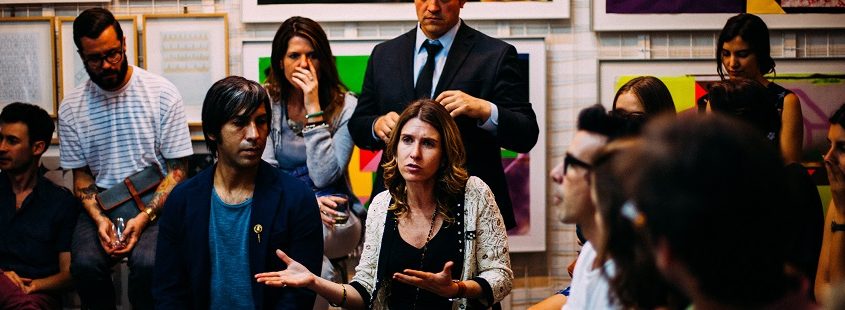Nancy White on powerful facilitation practices: self-awareness, don’t do it alone, experiment, commitment
Facilitation is arguably the most valuable skill in the world. If you can help people to be collectively more intelligent, you unlock vast wealth. Facilitation can also be applied to individuals, in assisting them to apply their capabilities to achieve what they want.
‘Facilitate’ means to make easier. If you can ease the path to people working well together, beautiful things can happen.
A while ago on The Virtual Excellence Show I interviewed Nancy White, recognized by many as a master facilitator in both virtual and physical spaces for the last couple of decades.
Here is a segment of our broad-ranging conversation in which Nancy shares deep insights into developing facilitation skills. Recommended! Watch the video, or read the full transcript below.
TRANSCRIPT
Ross: People in all walks of life: leaders, it’s all of us really, we all need to be facilitators. So what are the steps, how do we learn to become better facilitators? What’s that journey?
Nancy: There is a magical first step. It’s self awareness. You cannot begin to understand others until you’ve examined yourself.
For example, if I design a meeting, I design it for my preferences, I decide because I make sense through conversation. I don’t make sense through linearly going through the material and then commenting.
Yet someone else may make very much more sense by literally going through and commenting. When we understand I’m doing this so that I can be liked. Or I’m doing this to have power, or I’m doing this to give power to somebody else. Or I’m doing this to be invisible (and with virtual backgrounds, you can actually make yourself visible) humor, humor counts, okay?
Only then can you begin to design with and for other people. Because otherwise you’ve got your own blinkers on, your own limitations will limit what you can do. So I think, watching another facilitator, and then having another facilitator watch you and give you feedback, there’s so many things we don’t see about ourselves. It still amazes me, even after all these billions of years I’ve been doing it, how easy it is to not see.
The second step is don’t do it alone. And online, this is doubly true, because you’re managing technology, and you’re managing group process. And you’re trying to assess people, some are on video, some aren’t on video, some are chatting, some are chatting, so you’re really trying to cross lots of different information streams.
Facilitators hold the space, they hold those elements together. Do it with a pal, at least one pal if not more. And if not more, in fact, one of the things I’m seeing in a network that I’m supporting is people who are all working on their own projects around floodplains are helping each other in their virtual meetings.
Then they get the side benefit of better understanding what’s happening in another flood plain in another river system. So the need for each other is actually creating whole new bridges in developing their practice, not just in facilitating meetings at a time when they can’t get stakeholders together face to face.
Self awareness: Don’t do it alone. The next thing is learn two or three new things and try them out. People always afraid of failing. When you get in a meeting and say, listen friends, we’re going to try something new. It’s going to be an experiment, but I want things for us to be better than they are now. I need you to help me and support me to try and experiment and if it doesn’t work, it doesn’t work. But we’ve learned something.
Instead of saying, I’ve got this magic new way, you’ve got to do it my way. That doesn’t fly, folks. It doesn’t fly. Yes, you invite people into the learning. You said the excellence show. And I think it’s the experimenters show, the learner show, the people who are willing to work with just enough ambiguity that it doesn’t freak everybody out that it moves us forward in a complex time when I literally can’t predict what’s going to happen next. But I’m committed to moving us towards our purpose, and it’s a different mindset. It’s not just designing an agenda. It is a commitment to moving towards purpose.



